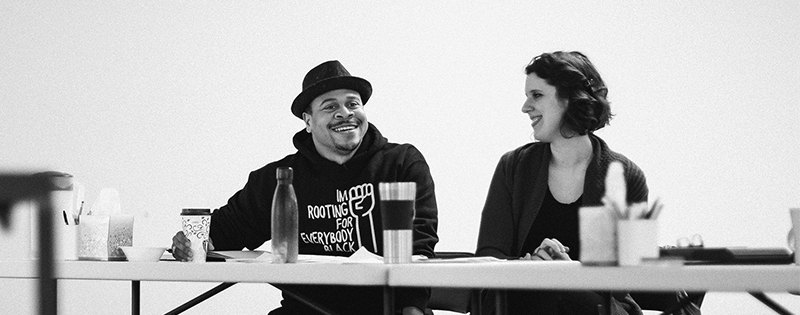Q&A: Director Marti Lyons
 Perhaps the most familiar title in Court’s 63rd Season, Guess Who’s Coming to Dinner is based on the 1967 film of the same name, starring Sidney Poitier, Spencer Tracy, and Katharine Hepburn. Despite the deep cultural impact of the film over the last 50 years, the stage adaptation written by Todd Kreidler is just a few years old. Staged first in Atlanta and then in Washington, D.C., Court’s production will be its Chicago premiere. Director Marti Lyons discusses what the implications of this production are for our audiences.
Perhaps the most familiar title in Court’s 63rd Season, Guess Who’s Coming to Dinner is based on the 1967 film of the same name, starring Sidney Poitier, Spencer Tracy, and Katharine Hepburn. Despite the deep cultural impact of the film over the last 50 years, the stage adaptation written by Todd Kreidler is just a few years old. Staged first in Atlanta and then in Washington, D.C., Court’s production will be its Chicago premiere. Director Marti Lyons discusses what the implications of this production are for our audiences.
Many audience members may already know this story from the beloved film. How does the play differ from the story that we have seen on the big screen?
When Associate Director Wardell Clark and I first encountered this material, we simply could not divorce it from our contemporary context. Once enough time has passed from an original production, there is no way to interpret it but to re-interpret it. My first response to this material was how harrowing it was to read this play juxtaposed against our current moment. Wardell and I will not just interpret, but with this beautiful text by Todd Kreidler, as well as and guidance from our dramaturg Gabby Randle and an outstanding company of actors and designers, we will re-interpret this beautiful, flawed, historical, unnerving, and urgent work.
What is it that you as directors hope to bring to the piece, given our world today is very different than (and, often the same as) the world of 1967?
The play’s exposure of white liberal hypocrisy rings so loudly in my ears (as much as my own indictment as any other) and this, as just one example of many in this complex material, feels so unnervingly resonant. Our production will be set fully in period in 1967 in San Francisco: within the household itself, and also with a sense of the world exploding outside of the household. This world will be pressing its way inside through our design and through the characters who enter the play. We believe that setting it in the 1960s with specificity will allow audience members to draw their own conclusions about the world of the play and the world as it stands, now.
You’ve mentioned that you want to bring the female characters out of the background and incorporate them more into the action of the play. How do you hope to do that, and with what intention?
In early conversations with our dramaturg Gabby Randle, we discussed the complex racial dynamics of the piece, but also the gender dynamics. The women in this play seem on the sidelines; they have opinions and may instigate, but they don’t drive any of the action. They seem observers and commentators, with a few rare exceptions. Gabby, Wardell, and I are curious to explore what it means to expose this, and to find opportunities for moments of awakening. ■
Guess Who’s Coming to Dinner runs from March 15 through April 15, 2018. Tickets are available now.
Photo of Wardell Julius Clark and Marti Lyons at first rehearsal by Joe Mazza.